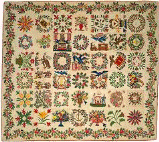Textile Society of America

Textile Society of America: Symposium Proceedings
Date of this Version
2024
Document Type
Presentation
Citation
Textile Society of America 2024 Symposium
Shifts & Strands: Rethinking the Possibilities and Potentials of Textiles, November 12-17, 2024, a virtual event
Abstract
Robert Rauschenberg suggested that any material has a “humanitarian reportage” or a history built into it, that opens art to the “strange and unpredictable” experience only comparable to everyday reality. Developing this idea, I will focus on the Jammers, a series of works with significant textile presence produced in 1975–76, and discuss how Rauschenberg’s relationship to textiles evolved from treating them as “materials” to recognizing them as cultural technologies. In 1975 he was on a fellowship in Ahmedabad, India, a period of intense experimentation.
Textiles were already a significant presence in his art, playing a subservient role of materials and fragments to be manipulated on the “flatbed” of a painting or subjectiles, the stratum of printed images. Collaboration with Indian artisans using local materials and experience of textiles in everyday life in India shifted those limits, resulting in a new non-appropriative and independent visual grammar, deeply appreciative of cultural difference and self-learning it facilitated. Cultural technology is a media studies concept relating to means of communication and a general framework describing the way a society is managing itself. Borrowing it for textiles, I suggest that the totality of knowledge, skill, aesthetics and ways of life resulting in the specific production, use and movement of textiles around the globe merit their consideration as a powerful cultural technology, conveying meanings through multi-sensory appeal in their deep involvement in everyday life. I consider Jammers as artworks that tap into a liberatory potential, while facilitating a deeper appreciation of textiles’ role in contemporary culture.
Included in
Art and Materials Conservation Commons, Art Practice Commons, Critical and Cultural Studies Commons, Fashion Design Commons, Fiber, Textile, and Weaving Arts Commons, Fine Arts Commons, Museum Studies Commons


Comments
Published by the Textiles Society of America
Copyright 2024, the author. Used by permission